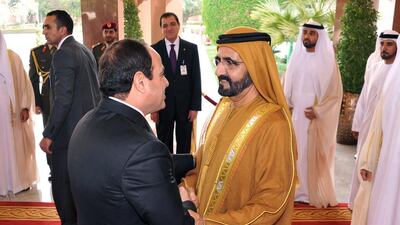When retired Jordanian Maj Gen Saleh Al Mayteh told the Emirates Centre for Strategic Studies and Research (ECSSR) late last week that the Arab world should build on the military success it has achieved in Yemen, he said he wasn’t advocating a new concept. Dr Al Mayteh argued that a joint Arab military force would bring strength to the region through cooperation in terms of strategy and the deployments of resources. Indeed, intellectuals and politicians have long discussed creating an Arab version of Nato, the 28-country alliance of countries from North America and Europe.
For decades, the Arab world has been filled with both rhetoric and action when it comes to the practicality of such a force. From the late 1940s to the 1960s, Arab states joined together to fight battles from Yemen to Palestine. In the mid-1970s, there was a unified Arab fighting force trying to bring stability to Lebanon. By and large, these initiatives did not have the coherence of a Nato-like force and suffered from different military doctrines and strategies. But that doesn’t mean that the region couldn’t do with a unified Arab fighting force now.
What made Dr Al Mayteh’s comments noteworthy were his calls to extent Arab partnership beyond the military realm into issues concerning energy, food and water security as well as economic partnership. The GCC’s intervention in Yemen on the side of the legitimate government, coupled with the recent Cairo Declaration between Egypt and Saudi Arabia point to a new military reality in the region. The anchor of this reality is the GCC’s security alliance, which has proven to be one of the most stable security arrangements in the modern Middle East through initiatives like the Peninsula Shield Forces.
Not only would a Nato-like Arab fighting force send the right message of unity to the international community in the face of regional threats, but such a force could spur deeper economic and even geopolitical corporation. As a region, we could use assets such as the large manpower reservoirs of Yemen and Egypt along with the entrepreneurial spirit of Jordan and the UAE to raise the overall collective health of the Middle East. As a region, we would be replacing rhetoric with concrete action on multiple fronts and thus preparing ourselves for challenges that lie ahead in the realms of food and energy security.

